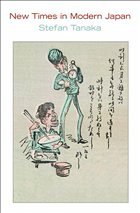New Times in Modern Japan concerns the transformation of time--the reckoning of time--during Japan's Meiji period, specifically from around 1870 to 1900. Time literally changed as the archipelago synchronized with the Western imperialists' reckoning of time. The solar calendar and clock became standard timekeeping devices, and society adapted to the abstractions inherent in modern notions of time. This set off a cascade of changes that completely reconfigured how humans interacted with each other and with their environment--a process whose analysis carries implications for other non-Western societies as well.
By examining topics ranging from geology, ghosts, childhood, art history, and architecture to nature as a whole, Stefan Tanaka explores how changing conceptions of time destabilized inherited knowledge and practices and ultimately facilitated the reconfiguration of the archipelago's heterogeneous communities into the liberal-capitalist nation-state, Japan. However, this revolutionary transformation--where, in the words of Lewis Mumford, "the clock, not the steam engine," is the key mechanism of the industrial age--has received little more than a footnote in the history of Japan.
This book's innovative focus on time not only shifts attention away from debates about the failure (or success) of "modernization" toward how individuals interact with the overlay of abstract concepts upon their lives; it also illuminates the roles of history as discourse and as practice in this reconfiguration of society. In doing so, it will influence discussions about modernity well beyond the borders of Japan.
Review:
... Scholars with an interest in the onset and consequences of modernity in Japan will find much in this important new work by Stefan Tanaka to stimulate and challenge them. Daniel Botsman(Journal of Asian Studies)
Table of contents:
Acknowledgments ix
Prelude: Time, Pasts, History 1
Chapter 1: Discovery of Pasts 27
Discovery One: Pasts prior to History 30
Discovery Two: Loss of Function 31
Discovery Three: The Archipelago Has a Past 39
Elevation of Time over Space 48
Chapter 2: "Nothing Is the Way It Should Be" 54
Space of Experience: Shuten Doji 55
Nature as a Machine 60
(An)Other View: Durability of the Imprinted Form 65
"Secrets of the Human World": Meiji Ghosts 69
Stories, Tales, History 76
Denigration of Experience 82
Chapter 3: Naturalization of Nation: Essential Time 85
The Externalization of Nature 89
Like a Dragonfly: The Instability of Being Other 92
Spirituality from a Dead Past 101
Nature and Nation 108
Chapter 4: Naturalization of Nation: Chronological Time 111
History as Histoire 114
Chronology: An Alibi of Time 118
Specters of History: National Literature and Art History 126
From Ghosts to Children: The Idea of Childhood 133
Conceptual Map 137
Chapter 5: Socialization of Society 144
The "Social Problem" 147
A Cry for Experience as Experience 151
Contestation of Wills 160
The Socialization of a National Society 164
Chapter 6: Socialization of Nature: Museumification 168
Frames 170
Nostalgia 177
Childhood 179
The Tutelary Complex 182
Ghostly Remnants? 190
Epilogue 193
Works Cited 203
Index 219
By examining topics ranging from geology, ghosts, childhood, art history, and architecture to nature as a whole, Stefan Tanaka explores how changing conceptions of time destabilized inherited knowledge and practices and ultimately facilitated the reconfiguration of the archipelago's heterogeneous communities into the liberal-capitalist nation-state, Japan. However, this revolutionary transformation--where, in the words of Lewis Mumford, "the clock, not the steam engine," is the key mechanism of the industrial age--has received little more than a footnote in the history of Japan.
This book's innovative focus on time not only shifts attention away from debates about the failure (or success) of "modernization" toward how individuals interact with the overlay of abstract concepts upon their lives; it also illuminates the roles of history as discourse and as practice in this reconfiguration of society. In doing so, it will influence discussions about modernity well beyond the borders of Japan.
Review:
... Scholars with an interest in the onset and consequences of modernity in Japan will find much in this important new work by Stefan Tanaka to stimulate and challenge them. Daniel Botsman(Journal of Asian Studies)
Table of contents:
Acknowledgments ix
Prelude: Time, Pasts, History 1
Chapter 1: Discovery of Pasts 27
Discovery One: Pasts prior to History 30
Discovery Two: Loss of Function 31
Discovery Three: The Archipelago Has a Past 39
Elevation of Time over Space 48
Chapter 2: "Nothing Is the Way It Should Be" 54
Space of Experience: Shuten Doji 55
Nature as a Machine 60
(An)Other View: Durability of the Imprinted Form 65
"Secrets of the Human World": Meiji Ghosts 69
Stories, Tales, History 76
Denigration of Experience 82
Chapter 3: Naturalization of Nation: Essential Time 85
The Externalization of Nature 89
Like a Dragonfly: The Instability of Being Other 92
Spirituality from a Dead Past 101
Nature and Nation 108
Chapter 4: Naturalization of Nation: Chronological Time 111
History as Histoire 114
Chronology: An Alibi of Time 118
Specters of History: National Literature and Art History 126
From Ghosts to Children: The Idea of Childhood 133
Conceptual Map 137
Chapter 5: Socialization of Society 144
The "Social Problem" 147
A Cry for Experience as Experience 151
Contestation of Wills 160
The Socialization of a National Society 164
Chapter 6: Socialization of Nature: Museumification 168
Frames 170
Nostalgia 177
Childhood 179
The Tutelary Complex 182
Ghostly Remnants? 190
Epilogue 193
Works Cited 203
Index 219
